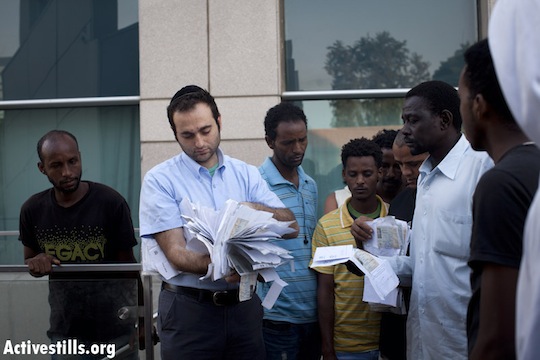Sudanese refugees from the Nuba Mountains are being registered by Israel’s Interior Ministry as South Sudanese, making it difficult for them to find and keep work, pay for rent, bills, or food, and subjecting them to potential arrest and deportation.

How would you react if someone told you that your name was no longer your name? Even though you had an official, government-issued identity card with it written on? Or that your nationality was now different from the one you’ve held all your life, though your passport proved where you were from? Now imagine that this unilateral change to your identity, which you have no power to challenge, strips you of your right to liberty, exposing you to arrest and detention.
In the spring of 2012, following the decision to end temporary group protection for South Sudanese asylum seekers in Israel, the African Refugee Development Center (ARDC) in Tel Aviv registered over 75 (although the total number affected is believed to be double that) Sudanese citizens who went to renew their visas at the Ministry of Interior and were denied. Instead, the asylum seekers received a letter saying that they were from South Sudan and that they had to leave Israel voluntarily by April 1, 2012 or face deportation. As the problem grew, the ARDC began to write, call and hold meetings with MOI representatives who, if they replied at all, variously responded that there was either no problem or that the problem was being looked into, with no further commitments.
Eventually, a legal petition was filed against the ministry in July 2012, challenging both the incorrect identification of Sudanese as South Sudanese and the lack of government transparency throughout the development of this situation. The MOI responded to the petition, inviting Sudanese asylum seekers from Darfur to reclaim their visas, which would list “Sudanese” as their nationality. The response also denied any awareness of this situation for the first few months, in spite of documentary evidence to the contrary.
This alleviated some of the problem. However, at least 45 asylum seekers from the Nuba Mountains (where the Sudanese government is currently carrying out a campaign being classified by some as genocide), who made up the vast majority of those misidentified as South Sudanese, received visas with “South Sudan” written on them. The Ministry of Interior vaguely explained that their cases needed further examination. Given that deportations of South Sudanese were ongoing at this time, the petitioners and others faced great difficulty in finding and keeping work, and subsequently paying for rent, bills, food, and other expenses. The unlucky ones were arrested and jailed, swept up in the government’s effort to drain the country of South Sudanese. A typical story is that of 20-year-old Ibrahim, who fled the Darfuri crisis. Ibrahim spent four months without a visa, during which time he became homeless and unable to get work. Desperate, he begged to return to Darfur.
NGOs and lawyers began the Sisyphean task of filing another challenge – this time to correct the status of Sudanese from the Nuba Mountains and enable them to get their visas back. A court hearing was granted, and on September 19, the MOI confirmed it had decided to recognize established geographical facts, admitting the Nuba Mountains are in Sudan, and that Nubans (particularly those named in the petition) should once again receive visas with “Sudanese” written as their nationality.
Happy ending? Not yet. Petitioners who subsequently went to renew their visa presented the court document with the MOI decision and their name circled on it, and again received a visa with “South Sudan” listed as the nationality. This issue was once again brought to the immediate attention of the MOI; once again, the response has been the sheer sound of silence. At the time of writing, as a result of this catastrophic tinkering, jobs continue to be lost and refused, rights continue to be denied, and a trickle of arrests is once more shivering its way through Israel’s Sudanese community, with at least three reported since the court hearing.
This is an especially ludicrous part of the government’s war of attrition on asylum seekers. When logic and evidence are so mysteriously and comprehensively brushed aside, we enter the kind of arbitrary, absurd and dysfunctional tyranny associated with Orwellian satire. “We are at war with Eurasia. We have always been at war with Eurasia.” Why? Because the government said so, and attempting to counter with logic is folly, because logic has been kicked out along with moral fortitude and self-awareness. The ultimate responsibility lies with Minister of the Interior Eli Yishai, whose pathological determination to homogenize Israel’s population has come to dominate the national discussion on asylum seekers. This discourse is now being continuously sharpened by Yishai in an attempt to bolster his public standing ahead of January’s elections.
But that is a broader problem in need of a longer-term fix. For now, there are vulnerable asylum seekers in Israel who have been locked in a recurring nightmare. As long as the government continues to play make believe, randomly rewriting the facts of people’s lives at will, no one knows what the next twist in the tale will be.

